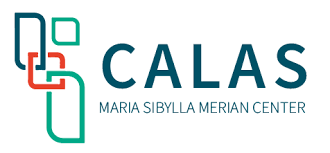Maria Sibylla Merian Center for Advanced Latin American Studies (CALAS)

The Maria Sibylla Merian Center for Advanced Latin American Studies in the Humanities and Social Sciences (CALAS) is a university-based Center for Advanced Studies founded by a consortium of Latin American and German universities. The University of Guadalajara, Mexico, houses the head office of CALAS while three regional offices are located at the Facultad Latinoamericana de Ciencias Sociales (FLACSO) in Quito, Ecuador; the Universidad de Costa Rica in San José, Costa Rica; and the Universidad Nacional San Martín in Buenos Aires, Argentina. The German Universities Bielefeld, Kassel, Hanover and Jena are responsible for the project management. In addition, numerous other universities and research facilities from all over Latin America are associated with CALAS.
The founding of CALAS in March 2017 was the result of an initiative by the Federal Ministry of Education and Research (BMBF, Germany) to set up a Center for Advanced Studies in the field of humanities and social sciences in Latin America.The bilateral (Latin American) bodies of CALAS are composed of a Board of Directors and a Steering Committee. An internationally renowned Advisory Board is set up for academic advice.
As a Center for Advanced Latin American Studies, CALAS seeks to foment research of interest in the social sciences and humanities in Latin America, applying historical, scientific and systematic approaches and employing transdisciplinary and transregional dialogue. Through this cross-pollination of ideas and methods, CALAS aims to stimulate the establishment of a new Latin American research landscape of Centers for Advanced Studies, which create a space for the development of a new generation of transregional and dialogue-oriented research on an international level.
CALAS’ activities also serve to unite, expand, and amplify expertise on Latin America in the humanities and social sciences fields at the participating German universities, thus strengthening the institutional framework for Latin American research in Germany. Towards the common end of promoting research on Latin America through a transregional exchange, German and Latin American partners work together to:
- pursue exemplary research through a regional network of thematic research groups, promote the international visibility of these groups, and prepare them for knowledge transfer in other areas of society.
- enter into dialogue with internationally renowned researchers.
- contribute to the broadening of research-based teaching and partnerships with teaching programs, qualifying and preparing young academics for employment in the social sciences and contributing to the internationalization of research and teaching.
- develop and offer qualification programs for research professionals and executives to foster the development of transregional cooperation and the establishment of Centers for Advanced Studies, as well as to provide evidence-based advice to political actors, decision-makers and organizations.
Access to knowledge in Latin America is highly unequal; certain groups remain at a disadvantage on the basis of their economic level, race, region, and gender, barring their admittance into top research and education institutions. One of CALAS’ principal goals as a Center for Advanced Studies is to confront this disparity and serve as a counterweight to the unequal distribution of knowledge in the region. As an institution, CALAS will strive to reach a balanced gender ratio, support outstanding indigenous and African-American researchers and scholars, and provide a platform for dialogue between different systems of knowledge. Part and parcel of CALAS’ activities include holding discussions and debates on bilingual and intercultural education, discrimination, free access to education, and appropriate affirmative action mechanisms. The resulting views and position papers will be published on the CALAS internet platform.
CALAS current research program (2017-2029) addresses the topic "Coping with Crises: Transdisciplinary Perspectives from Latin America".